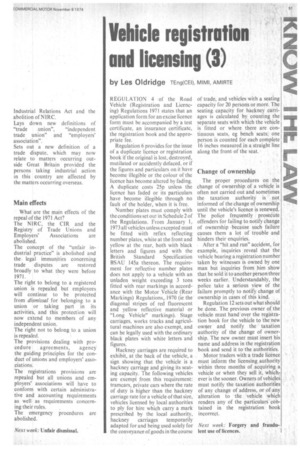Vehicle registration and licensing (3)
Page 133

If you've noticed an error in this article please click here to report it so we can fix it.
by Les Oldridge TEng(CEI), MIMI, AMIRTE REGULATION 4 of the Road Vehicle (Registration and Licencing) Regulations 1971 states that an application form for an excise licence form must be accompanied by a test certificate, an insurance certificate, the registration book and the appropriate fee.
Regulation 6 provides for the issue of a duplicate licence or registration book if the original is lost, destroyed, mutilated or accidently defaced, or if the figures and particulars on it have become illegible or the colour of the licence has become altered by fading. A duplicate costs 25p unless the licence has faded or its particulars have become illegible through no fault of the holder, when it is free.
Number plates must comply with the conditions set out in Schedule 2 of the Regulations. From January 1973 all vehicles unless excepted must be fitted With reflex reflecting number plates, white at the front and yellow at the rear, both with black letters and figures and with the British Standard Specification BSAU 145a thereon. The requirement for reflective number plates does not apply to a vehicle with an unladen weight exceeding 3 tons fitted with rear markings in accordance with the Motor Vehicle (Rear Markings) Regulations„ 1970 (ie the diagonal stripes of red fluorescent and yellow reflective material or "long Vehicle" markings). Stage carriages, works trucks and agricultural machines are also exempt, arid can be legally used with the ordinary black plates with white letters and figures.
Hackney carriages are required to exhibit, at the back of the vehicle, a sign showing that the vehicle is a hackney carriage and giving its seating capacity. The following vehicles are exempt from this requirement: tramcars, private cars where the rate of duty is higher than the hackney carriage rate for a vehicle of that size, vehicles licensed by local authorities to ply for hire which carry a mark prescribed by the local authority, hackney carriages temporarily adapted for and being used solely for the conveyance of goods in the course of trade, and vehicles with a seating capacity for 20 persons or more. The seating capacity for hackney earn ages is calculated by counting the separate seats with which the vehicle is fitted or where there are continuous seats, eg bench seats; one person is counted for each complete 16 inches measured in a straight line along the front of the seat.
Change of ownership
The proper procedures on the change of ownership of a vehicle is often not carried out and sometimes the taxation authority is not informed of the change of ownership until the vehicle's licence is renewed. The police frequently prosecute offenders for failing to notify change of ownership • because such failure causes them a lot of trouble and hinders their enquiries.
After a "hit and run" accident, for example, inquiries reveal that the vehicle bearing a registration number taken by witnesses is owned by one man but inquiries from him show that he sold it to another person three weeks earlier. Understandably, the police take a serious view of the failure promptly to notify change of ownership in cases of this kind.
Regulation 12 sets out what should be done. The previous owner of the vehicle must hand over the registration book for the vehicle to the new owner and notify the taxation authority of the change of ownership. The new owner must insert his name and address in the registration book and send it to the authorities.
Motor traders with a trade licence must inform the licensing authority within three months of acquiring a vehicle or when they sell it, whichever is the sooner. Owners of vehicles must notify the taxation authorities of any change of address, or of any alteration to the vehicle which renders any of the particulars contained in the registration book incorrect




































































































































































































